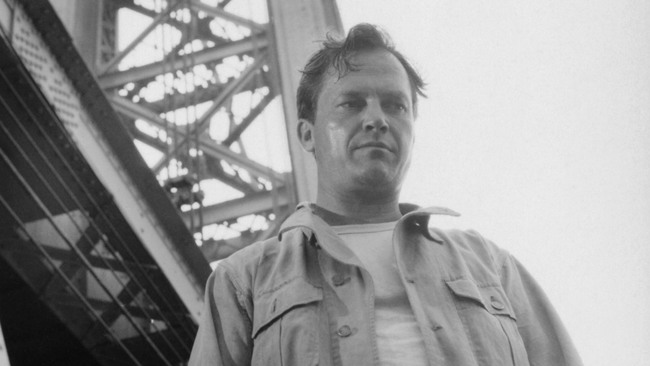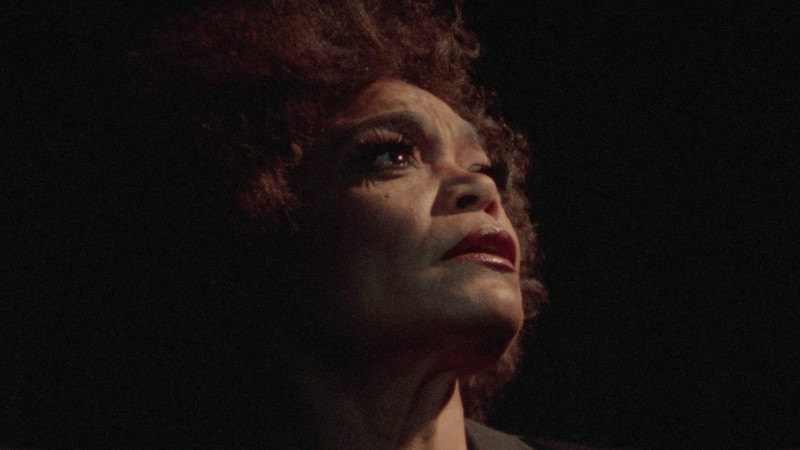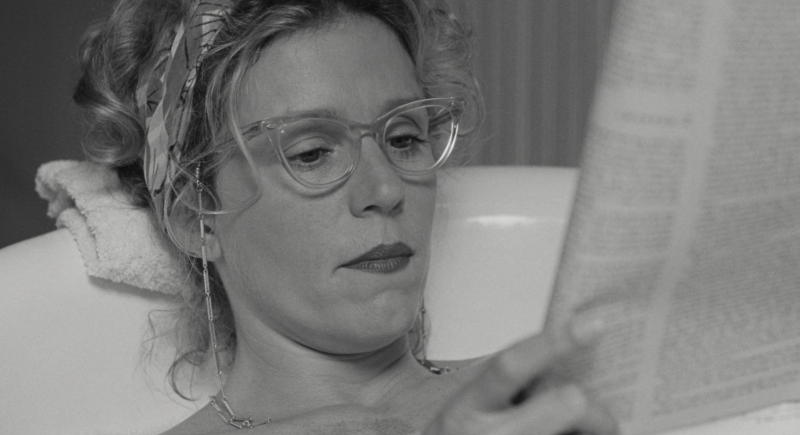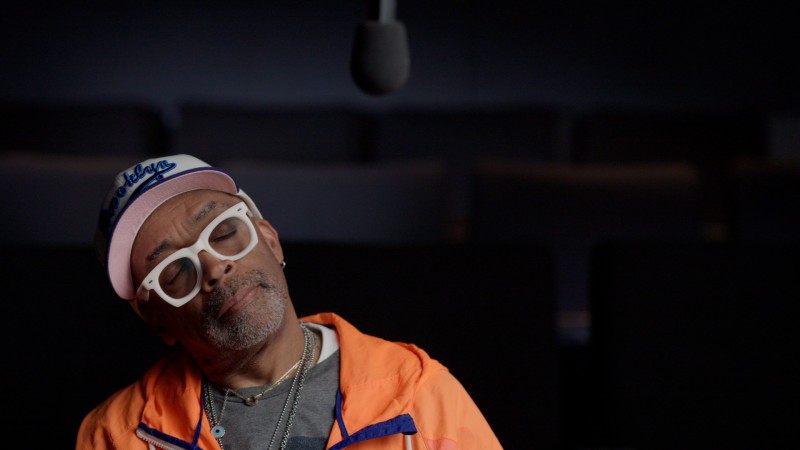Beauty and the Beast: Ralph Meeker in Something Wild

Carroll Baker, as Mary Ann, appears in every scene of Something Wild (1961). Through her sensitive, visceral performance and its claustrophobic framing by director Jack Garfein (then Baker’s husband), the viewer is forced into a painful emotional and physical intimacy with her character, a young student traumatized by a brutal rape. Ralph Meeker, as Mike, doesn’t appear until nearly halfway into the movie, when he enters as a pair of arms grabbing Mary Ann from behind, pulling her back from the railings of the Manhattan Bridge. The staging immediately links him to the faceless man who, in the movie’s first scene, grabbed her as she walked home through a park—foreshadowing the way Mike will morph from her savior into her captor, luring her into his cellar apartment and then locking her in. His character is always filtered through her point of view—confused, fearful, and ambivalent—but Meeker’s performance is at the heart of the film’s deeply uncomfortable impact.
The first evening in his apartment he fusses over her, pulling out her chair, jumping up to wait on her, at once comical and pathetic in his eagerness to take care of her. While she eats he sits half turned away, pretending to leaf through a magazine, his gaze riveted on her with helpless longing as she gulps a glass of milk. Later that night he comes home falling-down drunk, a shambling mess, crawling on all fours and groping for her. The staging of this attack is as stylized as dance. When she pushes him away he braces himself against the floor and shakes his head like a dog coming out of the water. The key to this strange man lies in Mary Ann’s nightmare, with the vision of a painting filled with satyrs assaulting women and a fallen stag whose eye melts down the canvas. Mike, with his bandaged eye, is like a bewitched beast: half man, half animal. He keeps making unpredictable and unnerving transitions, from a subhuman brute to a lonely guy sitting at his kitchen table cutting out pictures of women for a scrapbook. It’s disturbing when he trashes the apartment in a drunken rampage, even more so when he tidies up and presents his captive with a steak dinner, complete with flowers (in a milk carton) and French wine, before abruptly asking her to be his wife. As Sheila O’Malley writes in her beautiful essay on the film, “In a revelatory performance, he makes the troll under the bridge an almost tragic figure.”
The performance was certainly a revelation to me, because I always thought of Ralph Meeker as Mike Hammer in Kiss Me Deadly (1955): a sexy thug, a sleazy charmer, a cocky yet somehow likable heel. On stage, Meeker played Stanley Kowalski (the first actor to take over the part from Marlon Brando) and Hal, the virile drifter in William Inge’s Picnic who sparks lust in small-town women. On-screen he specialized in bad guys, from a smirking moral degenerate in The Naked Spur to a hunky outlaw in Jeopardy (both 1953). There was something about his good looks that lent itself to heavies: a sneering twist to his grin, small eyes shaded by low brows, a voice that easily turned flat and abrasive. His face and body alike were hard and compact and gleaming like a bullet; in many roles he embodied an undiluted, sometimes toxic masculinity.
The first shock in Something Wild is how completely he transforms himself physically, burying his sex appeal under the guise of a flabby, seedy slob. He slumps, belly out, and walks awkwardly, flat-footed. His face is crumpled and uncertain, his smile a feeble, off-key attempt to coax or disarm, to belie what he’s really doing. The concealment of one eye (after Mary Ann kicks him in the face, an incident he is too drunk to remember afterwards) adds to his opacity, the sense of both his woundedness and his semi-blindness. The heaviness of his movements mirrors the burdened way she moves after the rape; they have both become unhappy prisoners in their bodies. Mike is so weighted down and shut in by his own needs that he never considers what Mary Ann wants, or wonders how she wound up on the brink of suicide. Clinging to the notion that having saved her gives him the right to keep her, he seems to peer out from the crushing gloom of his mind and perceive her dimly as salvation—“my last chance,” as he bluntly tells her.
Apart from his first appearance on the bridge, Mike is never seen outside of the basement room that so perfectly represents his existence: a dank, grimy cell, but with a touch of monastic austerity, white sheets pulled tight on the narrow bed—a piercing image of loneliness and of his desire for something better than a squalid, beast-like existence. After the film’s searing depiction of a harsh and uncaring city, it’s possible to understand why Mary Ann might voluntarily withdraw into this prison-cum-sanctuary. Nonetheless, her final decision to stay will always remain controversial and profoundly ambiguous. Is this a tale of two damaged souls finding redemption in each other, or of a woman so destroyed by a random attack that she can only find security by submitting to a man who is a kinder, gentler version of her rapist?
It may be both. Meeker’s performance allows no easy answers. As he demonstrated in Kiss Me Deadly, he was able to dwell in ambiguity and to provoke ambivalence, never more so than in the scene where Mike proposes. His clumsy attempt at a romantic dinner is agonizing to watch—you simultaneously shrivel with pity at his failure and recoil from the lunacy of his delusions. “What’s wrong with me?” he asks simply when she refuses him, a line that is at once heartbreaking and almost laughable. His quiet, deceptively reasonable tone is punctuated by sudden barks of anger when she pushes back with questions. But nothing is more chilling than his response when she says she doesn’t want him: “It would be better if you did,” he says, with self-serving conviction, “Better for both of us.”
Yet what dominates this moment is the desperate pull of his sadness. As in the first scene where he pursued her, he is on the floor, on his knees, while she stands above him. When Mary Ann tells him it was she who kicked his eye out and that she’ll do it again, he turns away, his whole body sagging with shame and disappointment and frustration. Most terrible of all is how little he seems to care about losing his eye, and how this indifference gets at what it means to be so completely unloved. Going out the door he turns back and says, “I still need you,” his face filling the screen with a look of bottomless pleading and hurt. Perhaps it is this, the evidence of another human being’s pain, that saves Mary Ann. “Sweet are the uses of adversity,” runs the line from As You Like It that is heard in an early scene, and that summons the paradox of Mike: “Which, like the toad, ugly and venomous, wears yet a precious jewel in his head.”




